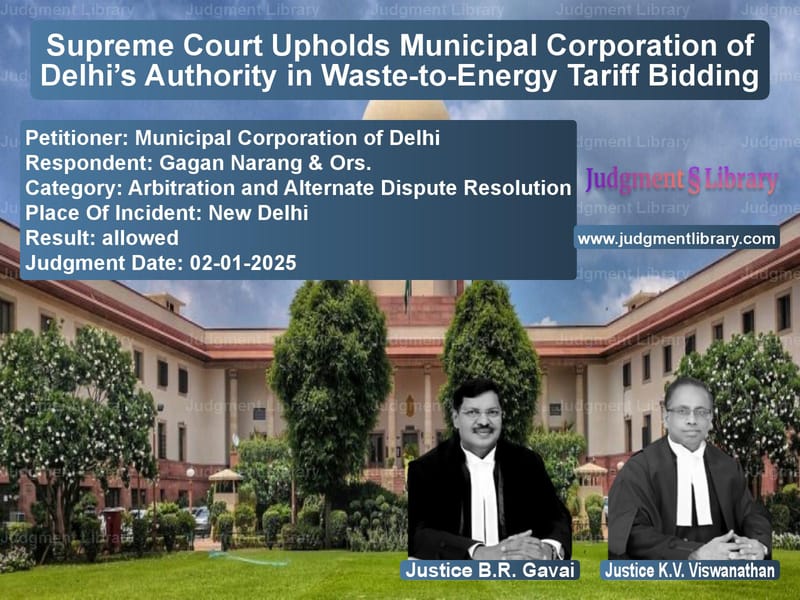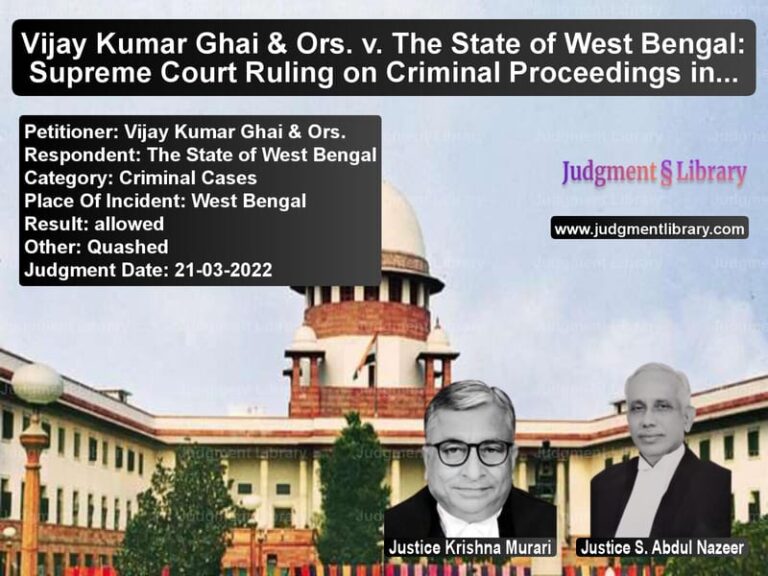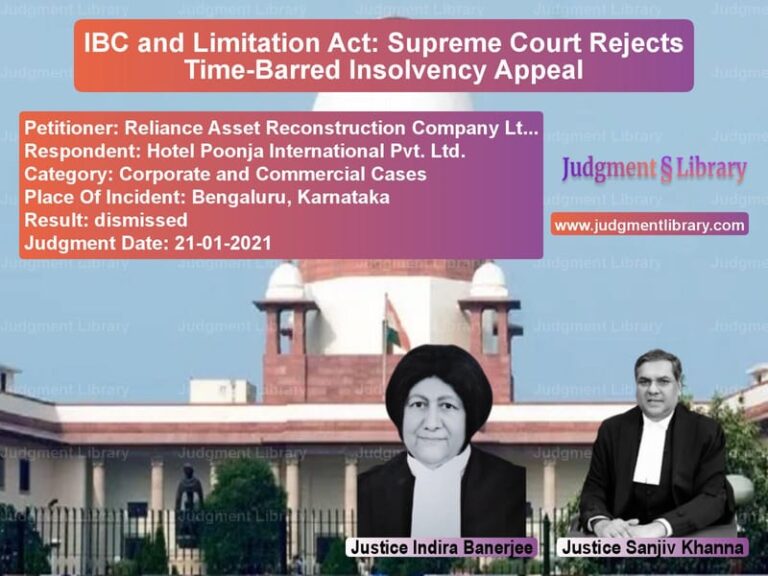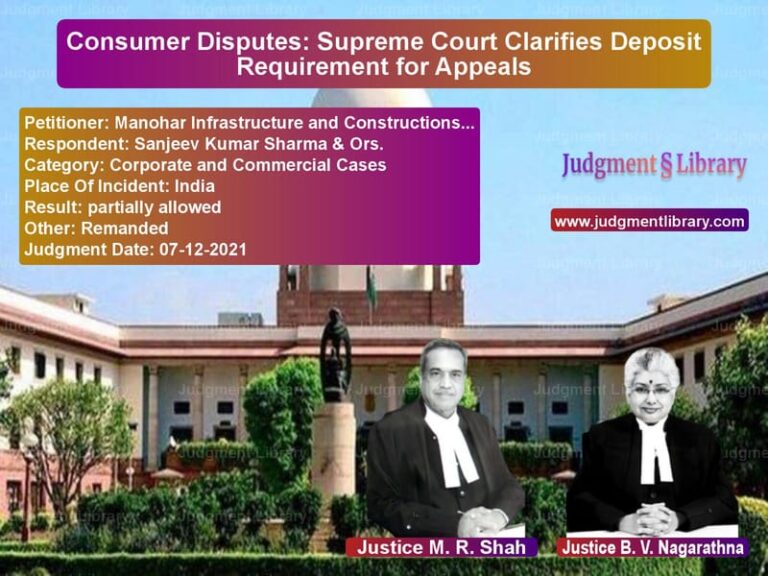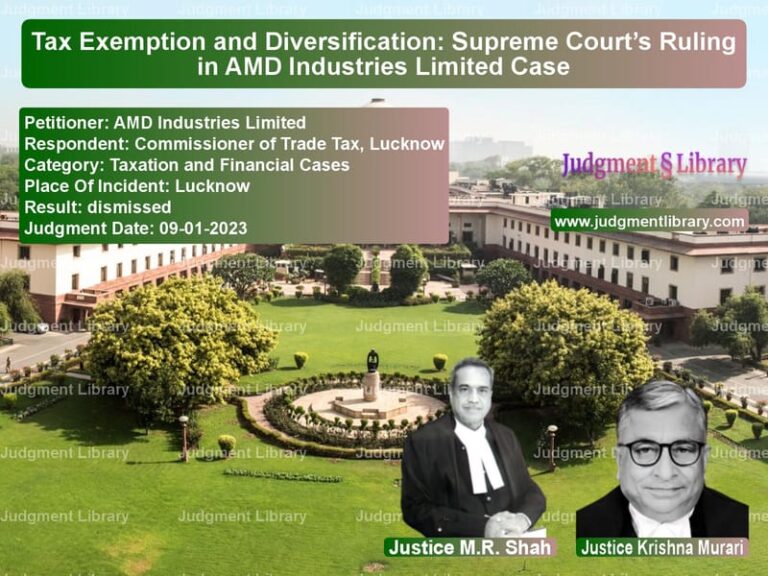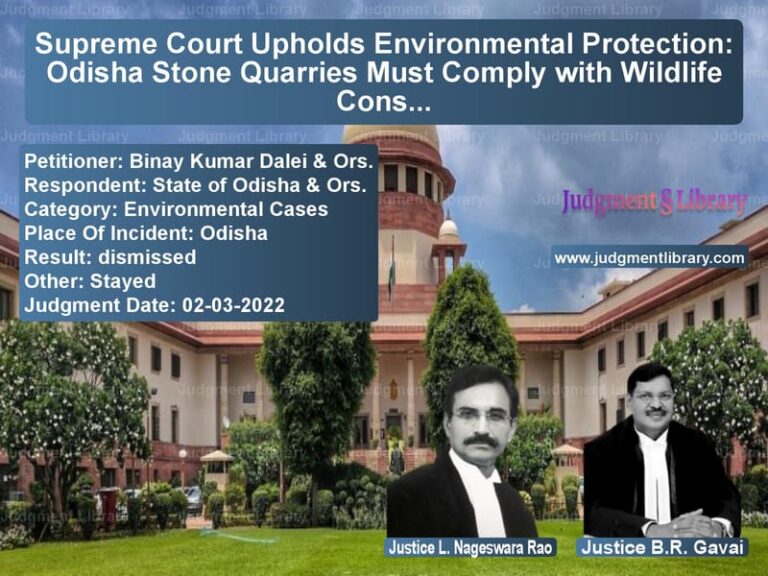Supreme Court Upholds Municipal Corporation of Delhi’s Authority in Waste-to-Energy Tariff Bidding
The Supreme Court of India recently delivered a landmark judgment in the case of Municipal Corporation of Delhi vs. Gagan Narang & Ors., addressing the authority of the Municipal Corporation of Delhi (MCD) to initiate a tariff-based bidding process for a Waste-to-Energy (WTE) project in New Delhi. This case revolved around the interpretation of the Electricity Act, 2003, and its applicability to municipal bodies engaged in power procurement. The verdict clarifies the scope of regulatory control over renewable energy projects and affirms the role of local authorities in sustainable waste management.
Background and Context
The dispute originated when the MCD issued a Notice Inviting Tender (NIT) and a Request for Proposal (RfP) on July 15, 2022, inviting bids for a Waste-to-Energy project at Narela Bawana, New Delhi. The project was designed to process 3,000 metric tonnes per day of municipal solid waste to generate at least 28 MW of power.
The Delhi Electricity Regulatory Commission (DERC) approved the lowest bid of Rs. 7.38/KWh submitted by M/s JITF Urban Infrastructure Ltd. However, the Appellate Tribunal for Electricity (APTEL) set aside DERC’s decision on the ground that the MCD was not authorized under Section 63 of the Electricity Act to conduct a bidding process for power procurement. The matter was then escalated to the Supreme Court.
Petitioner’s Arguments
The MCD, represented by Senior Counsel Ramji Srinivasan, argued the following points before the Supreme Court:
- APTEL misinterpreted Sections 63 and 86(1)(b) of the Electricity Act by limiting their applicability only to distribution licensees and generating companies.
- The MCD had a statutory duty under Rule 15(v)(b) of the Solid Waste Management (SWM) Rules, 2016 to establish WTE projects.
- The National Tariff Policy, 2016, mandates that distribution licensees procure 100% of the power generated from WTE plants.
- The DERC, as a regulatory body, had the authority under Section 86(1)(b) of the Act to approve the bidding process and adopt the tariff.
- There were no central guidelines for WTE projects, and in the absence of such guidelines, the DERC had the power to regulate the process under Section 86(1)(b) of the Act.
- The WTE project was in the larger public interest as it facilitated efficient waste management and contributed to renewable energy generation.
Respondent’s Arguments
Senior Counsel Basava Prabhu Patil, representing the respondent, presented the following counterarguments:
- Only distribution licensees or generating companies could invoke Section 63 of the Act.
- The Ministry of Power, not the DERC, was responsible for setting tariffs for WTE projects.
- The MCD did not have the authority to initiate a tariff-based bidding process for power procurement.
- The National Tariff Policy guidelines did not explicitly permit municipal bodies to engage in electricity procurement.
- Allowing the MCD to conduct bidding under Section 63 would set a precedent allowing unauthorized entities to influence power tariffs.
Supreme Court’s Decision and Verbal Arguments
The Supreme Court, after hearing both parties, ruled in favor of the MCD. The bench, comprising Justices B.R. Gavai and K.V. Viswanathan, made the following key observations:
- “A plain reading of Section 63 does not restrict the filing of tariff adoption applications to Discoms or generating companies.”
- “The MCD, being statutorily responsible under SWM Rules, 2016, cannot be treated as a stranger to the bidding process.”
- “DERC’s regulatory role extends to ensuring a fair, competitive, and transparent procurement process.”
- “Public interest demands efficient solid waste management, and restricting WTE projects would be counterproductive.”
The Court further noted:
“The duties imposed by the SWM Rules, 2016, and the provisions of the Electricity Act must be read harmoniously. The MCD was fulfilling its statutory obligation in establishing the WTE project, and the regulatory body’s approval was in line with established legal principles.”
The judgment clarified that:
- Section 63 of the Electricity Act does not expressly limit who can initiate a tariff adoption request.
- The DERC had correctly exercised its authority under Section 86(1)(b) to regulate electricity procurement.
- The National Tariff Policy, 2016, mandated the purchase of power from WTE projects, reinforcing MCD’s position.
- APTEL’s restrictive interpretation was incorrect and ignored the larger environmental and policy considerations.
Conclusion
The Supreme Court’s verdict in favor of the MCD marks a significant precedent in power sector regulation. By affirming the authority of municipal bodies in electricity procurement, the ruling supports sustainable waste management initiatives and strengthens renewable energy policy enforcement.
With this judgment, the Supreme Court has provided clarity on the scope of Sections 63 and 86(1)(b) of the Electricity Act, reinforcing that regulatory bodies must consider public interest while interpreting statutory provisions.
Petitioner Name: Municipal Corporation of Delhi.Respondent Name: Gagan Narang & Ors..Judgment By: Justice B.R. Gavai, Justice K.V. Viswanathan.Place Of Incident: New Delhi.Judgment Date: 02-01-2025.
Don’t miss out on the full details! Download the complete judgment in PDF format below and gain valuable insights instantly!
Download Judgment: municipal-corporatio-vs-gagan-narang-&-ors.-supreme-court-of-india-judgment-dated-02-01-2025.pdf
Directly Download Judgment: Directly download this Judgment
See all petitions in Arbitration Awards
See all petitions in Dispute Resolution Mechanisms
See all petitions in Enforcement of Awards
See all petitions in Institutional Arbitration
See all petitions in Judgment by B R Gavai
See all petitions in Judgment by K.V. Viswanathan
See all petitions in allowed
See all petitions in supreme court of India judgments January 2025
See all petitions in 2025 judgments
See all posts in Arbitration and Alternate Dispute Resolution Category
See all allowed petitions in Arbitration and Alternate Dispute Resolution Category
See all Dismissed petitions in Arbitration and Alternate Dispute Resolution Category
See all partially allowed petitions in Arbitration and Alternate Dispute Resolution Category

